Varieties of waterproofing mastic and its application
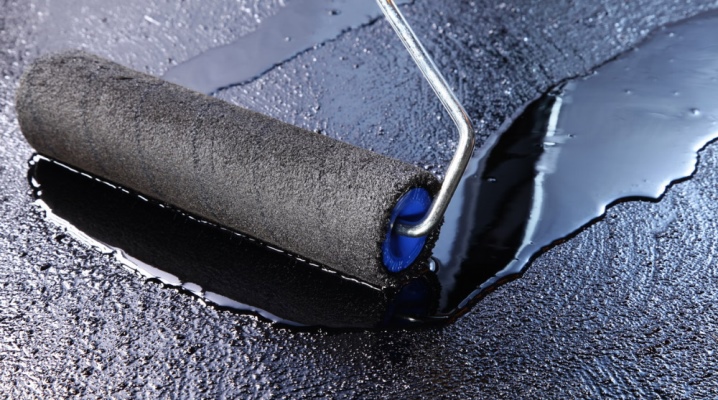
Often, in the process of carrying out various construction work, there is a need to organize a waterproofing system. Currently, a variety of materials and tools are used for this. A fairly common option is waterproofing mastic - such a substance has a number of important characteristics. Today we will talk about what this composition is, and what types it can be.
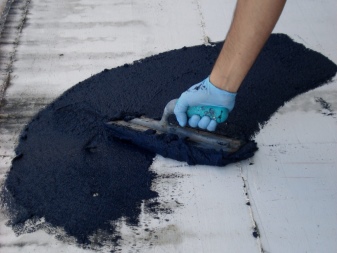
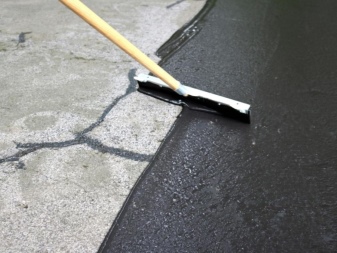
Description and purpose
Waterproofing mastic is a special acrylic or bituminous product that is created on the basis of innovative technical and scientific developments. It allows you to provide additional maximum reliable protection of all kinds of structures from the negative effects of moisture.
In addition, the mastic prevents the formation of mold and mildew on the surface of the processed products. This element allows you to significantly extend the service life of the structure.
The coating will not swell when exposed to water vapor. It allows you to create a perfectly even and uniform waterproof film; seams and other irregularities that spoil the appearance will not appear on the parts.
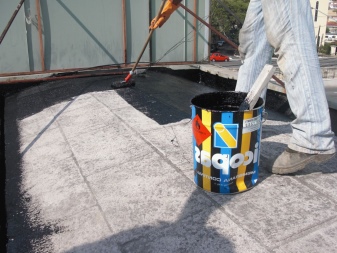
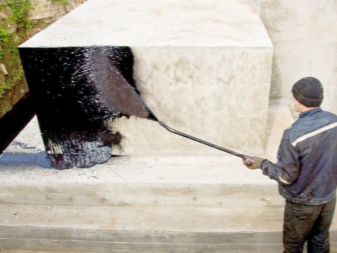
In the process of constant use, the coating made with mastic will not crack, it must have a high level of strength. This substance is able to withstand even sharp temperature changes.
Such products must comply with all established quality certificates. And also the main characteristics and requirements for mastic can be found in GOST 30693-2000.
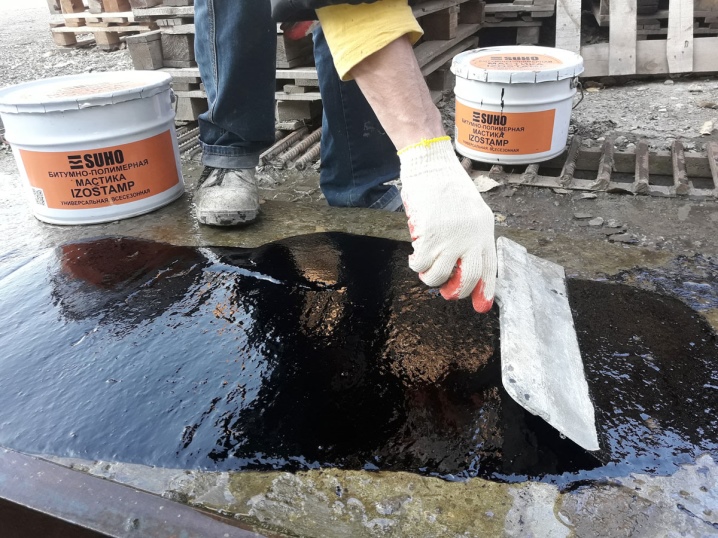
Species overview
A wide variety of such insulating materials are currently available. Among the main ones, it is worth mentioning such mastic models as hot bitumen, cold bitumen, and acrylic. Let's consider in more detail each of the listed types.
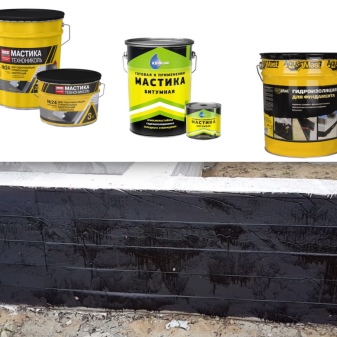
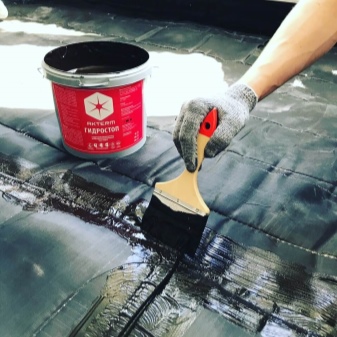
Bituminous hot
These types of waterproofing compounds are special mixtures that must be warmed up before use. They provide excellent adhesion to bitumen or tar rolls. Wherein when preparing such a mass, it should be remembered that it should be as elastic and homogeneous as possible.
Bituminous hot mastic at medium temperatures will retain a solid consistency without filler particles. When the temperature reaches 100 degrees, the substance should not foam or change its structure, and should not contain water.
When the temperature reaches 180 degrees, the mastic will start to pour out gradually. The main advantage of this type is its high adhesion. Such compositions will be able to perfectly interact with almost any type of surface, while the materials will adhere to each other as firmly and reliably as possible. But we must not forget that the correct and thorough preparation of such a mixture will take a significant amount of time, in addition, this requires special equipment.
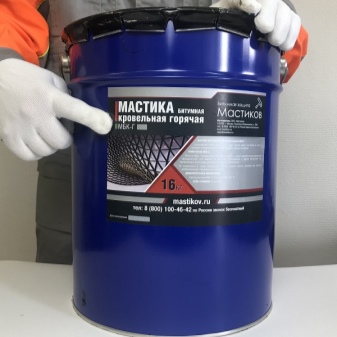
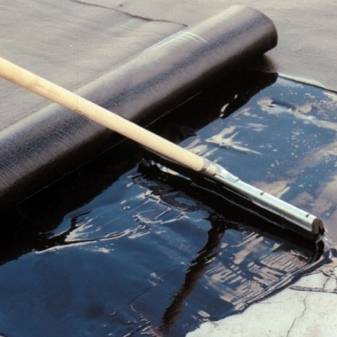
Bituminous cold
Cold varieties of hydroisol do not require special preparation before use. Such MGTN should be maintained in conditions at a temperature of zero degrees.
For the manufacture of these insulating substances, special bitumen pastes and organic binders are used. In order for such a mastic to be applied to the structure, a little thinner is added to it beforehand. It can be special oils, kerosene or naphtha.
Such options are most often used for reliable gluing of waterproofing and roofing roll materials, to create an integral protective coating on metal products.
Bituminous cold varieties can greatly simplify and speed up the process of organizing waterproofing and roofing. In terms of strength, they are the same as the previous version.
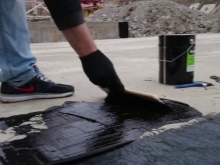
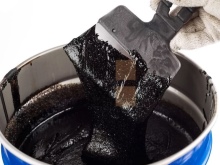
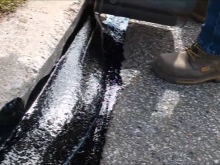
Acrylic
These versatile mastic options are a highly resilient polyacrylic waterproof product that is used to form an even and seamless protective film on products.
Such models are made on the basis of acrylic dispersions from specialized chemical raw materials. This type of mastic is used in many areas, therefore, of all varieties, it is considered the most common.
Acrylic sealant provides excellent moisture protection. It is particularly resistant to cracking and wear during use. In addition, the substance has excellent sun protection characteristics.
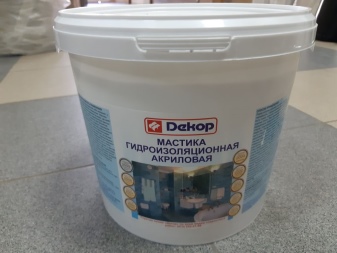
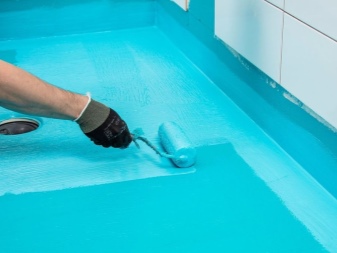
Such patterns can be applied to concrete surfaces, including seamless concrete floors, lime-cement materials, drywall. They do not require the use of additional components before direct application to structures.
Acrylic waterproofing mastic has a neutral odor and better adhesion to plastered surfaces. It dries quite quickly after application. And also such varieties, if necessary, can be easily coated with water-soluble pigments.
These types of mastics are absolutely fireproof and explosion-proof. This waterproofing is considered environmentally friendly, it will not emit any harmful elements after application.
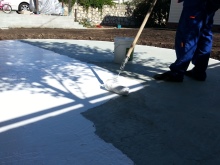
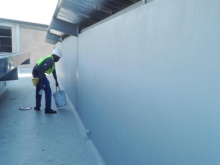
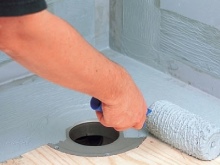
Popular manufacturers
Today, buyers can see a wide variety of waterproofing mastics from different manufacturers in hardware stores. Let's consider the most popular brands.
- TechnoNIKOL. This manufacturing company produces insulating mastic, which is designed to protect roofing materials, interior spaces. Most of the products are bituminous, but acrylic options are also found. All of them have a high degree of elasticity and heat resistance. Such substances are able to adhere perfectly to a wide variety of surfaces. They are made with special additives that can increase the quality and strength of the mastic. In addition, the products can boast of high adhesion and resistance to temperature changes. Many models will cure within 24 hours after application. In the range of products of this company, you can find individual options designed for a specific specific structure (for the foundation, roof, bathrooms).
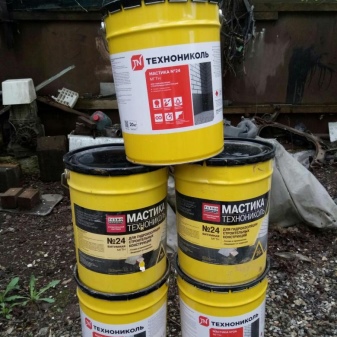
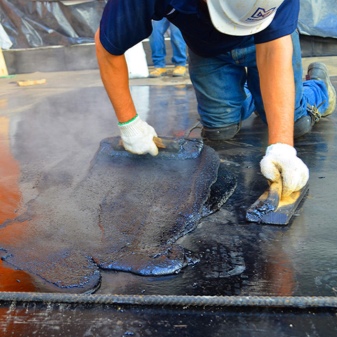
- Litokol. The products of this company are made exclusively from high quality raw materials. It is produced on the basis of an aqueous dispersion of special resins of synthetic origin and special fillers. After complete drying, models have an increased elasticity. They perfectly withstand high temperatures and various vibrations. And also such samples are highly resistant to the washout effect of water.
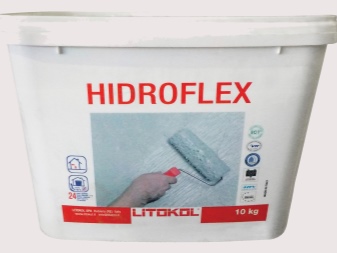
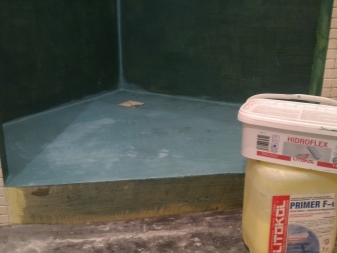
- Glims. The products of this manufacturer make it possible to organize waterproofing of floor coverings, walls, pools, foundations, basements. It can be used for both indoor and outdoor construction work. Such mastic models can be easily applied with a brush or spatula. They can cover both wet and dry surfaces.Glims mastic is vapor-proof, frost-resistant, it can easily withstand even significant water pressure. On a surface that is treated with such a substance, various finishing works can be performed in the future. The products of this manufacturer are absolutely environmentally friendly.

- Kiilto. The products of this Finnish company are mainly used in the construction of swimming pools. Most of the models are water-based latex. Such one-component samples do not require the use of other additional components prior to use. The mastic is considered to be quick-drying and quite elastic. In the process of drying, the composition begins to change its color.
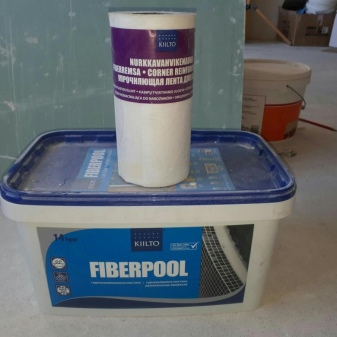
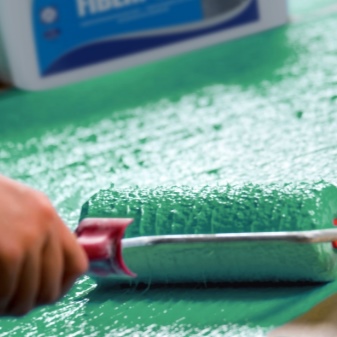
- "Blockade". The company produces polyurethane-based waterproofing mastic. Such environmentally friendly and safe compounds will be the best option for insulating bathrooms, flooring, foundations, pools, balconies and basements. They are also suitable for a parquet board.
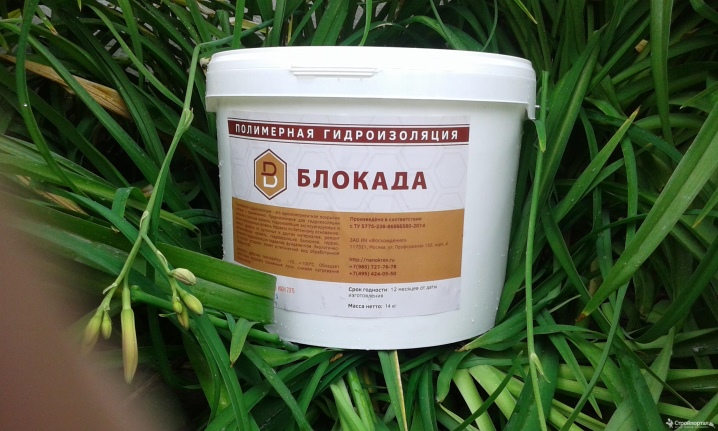
Applications
Various mastic models can be used to provide waterproofing for specific structures. There are separate varieties designed for the treatment of roofing, swimming pools and toilets, foundations, concrete. And they can also be designed for outdoor or indoor work (some samples are universal, they are suitable for any work).
Mastic is often taken for waterproofing horizontal internal surfaces, which are characterized by a high moisture content.
And also such a substance will be an excellent option for corrosion protection of various metal structures located underground.
The mastic is also used for the processing of above-ground pipelines, for sealing the places of contact between metal structures and concrete surfaces. It is sometimes used as an adhesive for wood, reinforced concrete and metal parts.
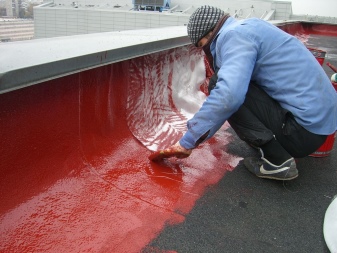
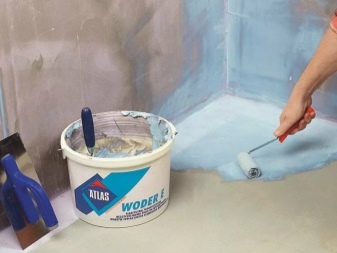
This waterproofing material can be purchased for quality sealing of joints and cracks in asphalt. The coating, produced using a bitumen composition, allows you to create a monolithic maximally strong film without seams, which has excellent resistance to atmospheric precipitation, temperature changes, in addition, it allows you to easily level the relief, if necessary.
Mastic often serves as a reliable and durable cushioning base between the plinth and the panels in the room. With the help of this substance, it is also permissible to seal welding seams.
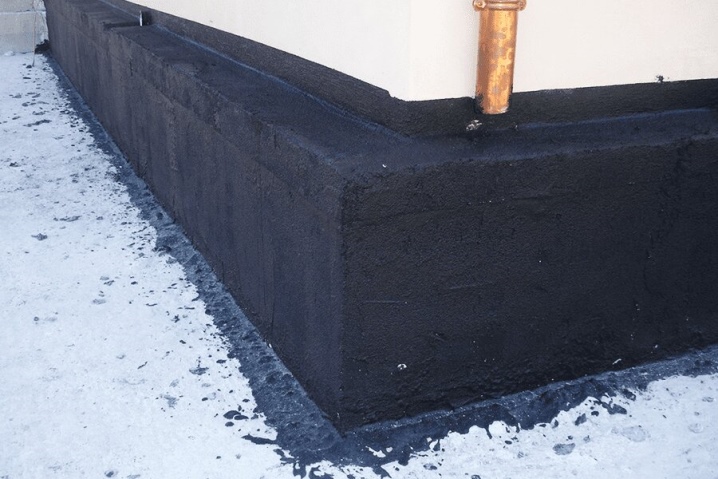
How to work with mastic?
Before applying the composition to the surface of the products, it is necessary to correctly determine the consumption - how much the mixture will fall on one m2. As a rule, all proportions are indicated in the instructions for the mass itself.
After that, you should properly prepare the material for waterproofing treatment. The mastic must be thoroughly mixed - it must be as homogeneous as possible. If it turns out to be too hard, then it must be diluted with a small amount of a special solvent.
If the mastic is frozen during storage, then it is preheated at a temperature not lower than +15 degrees Celsius. At the same time, it is worth preparing the surface to be processed.
To do this, first it is thoroughly cleaned of dirt, the porous elements are covered with a bituminous primer, rusty products are pre-cleaned and covered with a converter.
If the surface is wet, it is first dried with a gas burner. It is important to remember that all work should be carried out in appropriate protective equipment, including gloves, a mask, and glasses.
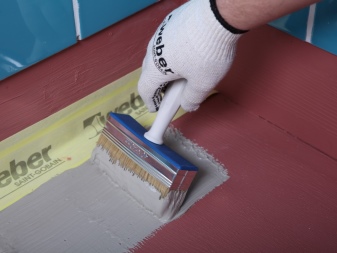
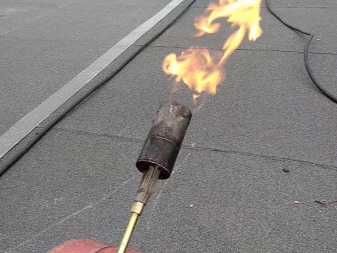
All work is recommended to be carried out outdoors. If you will still be processing indoors, take care of the organization of ventilation in advance. At the same time, work should not be carried out in places near open fire and heating equipment.
It is better to apply waterproofing mastic with a brush, roller. The spraying method can also be applied, but it can be carried out only in the complete absence of atmospheric precipitation and at a temperature not higher than -5 degrees.
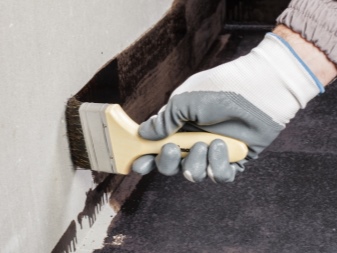
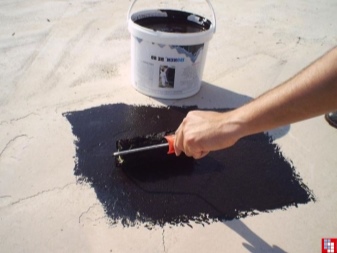













The comment was sent successfully.